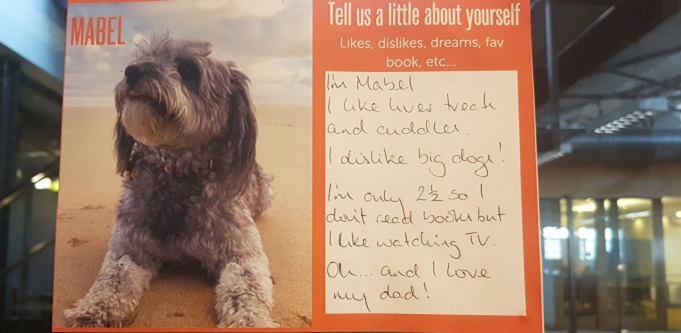
Mabel, one of the dogs in Verso's co-working office, belonging to the company's chief academic officer.
Workers at Footscray edutech firm Verso Learning know they’re a doggone lucky bunch.
Staff at the animal-friendly workplace can now get up to five days’ leave if their pet is sick or injured and in need of care. They’ll also get two days’ leave when they bring home a new pet or if their animal dies.
It’s all part of chief executive and founder Colin Wood’s vision for a more rewarding work environment.
“Increasingly as people work longer hours and put off families ’til later in life, they’re becoming more dependent on cats and dogs than humans,” he explains.
“I’ve run my own businesses for nearly 18 years and for the last seven or eight, my employees have had more dogs than kids.”
Wood founded this particular venture in 2014 – a startup with an app designed to help classroom teachers in their professional development.
Strong growth in the past year has seen the business expand to the US and the puppy love shows no sign of slowing in either country.
That’s because Verso uses co-working spaces like the Dream Factory in Footscray and We Work in the States, each of them animal friendly.
“Because we’re in a co-working space, the dogs that come in regularly have got profiles up on the wall and they’re valued members of the community,” Wood says.
“Someone will come and pat a dog for 30 minutes. And they’ll say ‘thanks, I needed that’ – and they’re people who don’t even work for us.”
In announcing its pet-friendly leave, Verso joins a select club of employers including Scottish brewer BrewDog, which introduced “puppy parental leave” last year.
Pooch policy hailed a winner
HR expert and director of HR Staff n’ Stuff Deborah Peppard hails the leave policy a win-win initiative.
“Pets play an enormous role in a lot of households, so I I don’t see it as a cost,” she says.
“If you have a great employment culture where you’re doing extra special things for employees, you’ll get that paid back ten-fold in terms of loyalty, productivity and commitment.”
It’s flexible workplace policies like these, she says, that tend to go down well with millennials in particular.
“By 2025, 75 per cent of the workplace will be millennials,” she observes.
“And millennials want to be seen as a whole person, so they tend to like unusual things like this.”
But Peppard urges caution on the part of any business owner who may rush to follow suit.
“Every workplace is different. It’s really about being creative and innovative with ideas and initiatives that will suit your employee base,” she explains.
“Ask them the question; ‘If we could do one thing in this business, what would you like it to be? A Friday team lunch? A walking meeting out in the fresh air?’ The answer will depend on what suits them and their workplace culture.”
Never miss a story: sign up to SmartCompany’s free daily newsletter and find our best stories on Twitter, Facebook, LinkedIn and Instagram.


COMMENTS
SmartCompany is committed to hosting lively discussions. Help us keep the conversation useful, interesting and welcoming. We aim to publish comments quickly in the interest of promoting robust conversation, but we’re a small team and we deploy filters to protect against legal risk. Occasionally your comment may be held up while it is being reviewed, but we’re working as fast as we can to keep the conversation rolling.
The SmartCompany comment section is members-only content. Please subscribe to leave a comment.
The SmartCompany comment section is members-only content. Please login to leave a comment.